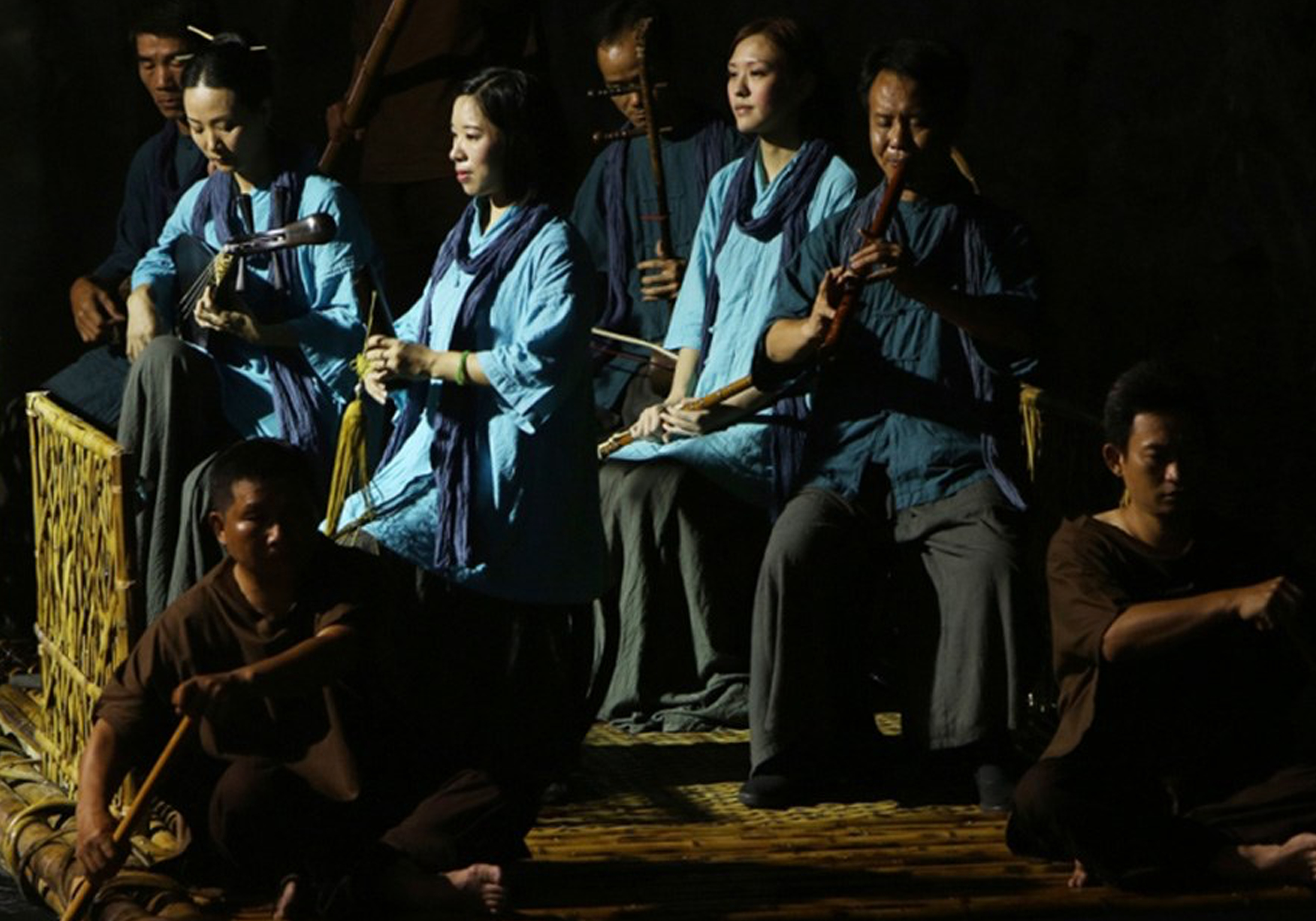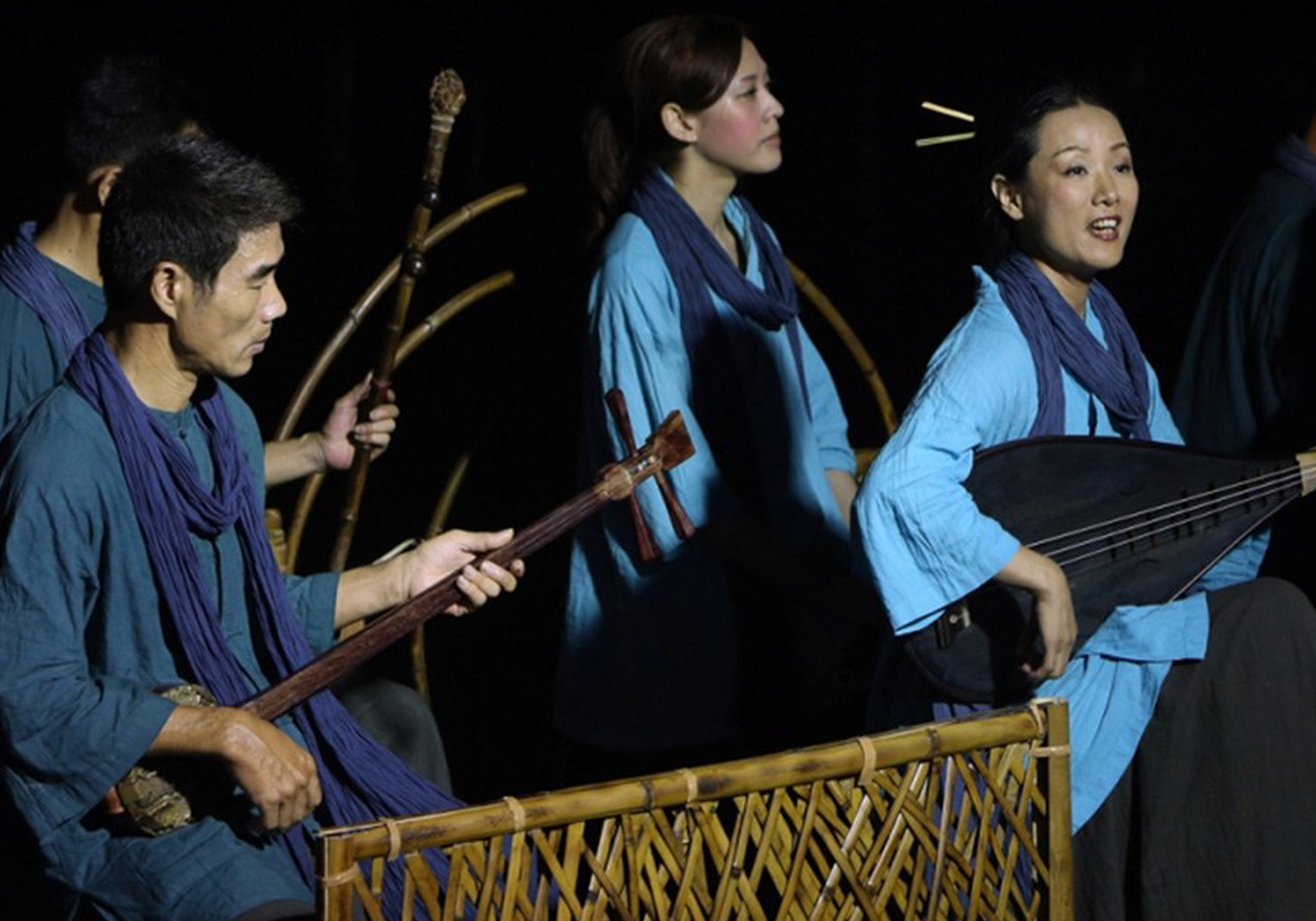心心南管樂坊作為南管演出、創作、傳承的表演藝術團體,除持續強化南管音律、合奏等本體音樂旋律之美,更期望藉由演出內容與場地、氛圍的統合規劃,彰顯這項有形文化財的當代價值,讓更多民眾得以感受南管之豐美。 南管原屬民間廳堂音樂,最常出現在閩南傳統院落、廟宇裡,並以其溫婉的唱詞、沉靜的旋律走過台灣四百年;在2009年以其最原始的狀態,獲選為世界非物質文化遺產。近年在有心的學者、藝術家及演奏家努力下,南管走進藝術殿堂,結合各項劇場元素,展現出新的樣貌!期望透過創新企畫,結合南管與金門傳統閩南建築,作一次完整的演出及講座規畫,展現物質與非物質文化遺產相融加分的效果。
As a performing artistic group devoted to the performance, creation and inheritance of nanguan music, Xinxin Nanguan Ensemble keeps enhancing the beauty of nanguan through embellishment of its tonality and ensemble, and further highlights the present-day value of this tangible cultural heritage via integrated content, stage and mood of the performance so that more people can have access to the abundance and elegance of nanguan music.
Nanguan was originally a music performed in folk venues, such as Min-nan traditional residences or temples mostly. Its gentle lyrics and elegant rhythm has endured four hundred years in Taiwan. In 2009, nanguan music was designated as UNESCO Intangible Cultural Heritage for its pure and original quality. Via the efforts of dedicated researchers, artists and performers in recent years, nanguan has stepped into the hall of art, and presented a new appearance by incorporating assorted theatrical elements. With innovative plans, Xinxin Nanguan Ensemble integrates nanguan music and traditional Min-nan residences in Kinmen, and conducts a set of comprehensive performances and lectures, demonstrating the exceptional effect of combining tangible and intangible cultural heritages.
心心南管樂坊 Xinxin Nanguan Ensemble
創辦人王心心成長於福建泉州的南管世家,長年累積的藝術素養及演出功力,堪稱閩南南管最純正的代表;但王心心不固守舊局,在深厚的專業上追求藝術突破,從曲風的實驗、題材的擴張、到燈光舞台的現代設計,每年都讓南管演出有令人意想不到的風貌。自03年以來,《琵琶行》、《葬花吟》、《聲聲慢》等一系列南管詩系列的創作,結合唐詩宋詞的南管曲韻,更將南管從民間音樂體系提昇到人文音樂的層次。03年,王心心創立心心南管樂坊,除了致力恢復清音雅樂的傳統,也嘗試讓南管在當代社會呈現嶄新面貌。曾合作的藝術家包括林懷民、羅曼菲、吳素君、簡文彬及游麗玉。10年首度嘗試跨國合作,與法國歌劇導演盧卡斯.漢柏斯合作創新南管歌劇《羽》。「心心南管樂坊」在跨界的同時不忘本質,精湛的唱功,結合台灣劇場精英的專業演出,呈現南管最精粹完美的一面,更期許能因此激發國人對在地文化的思考及傳統藝術的興趣。
WANG Xinxin, the founder of the group, grew up in a family of nanguan musicians in Quanzhou, Fujian Province. Years of immersion in the art and performing experience have made her the “orthodox” representative of nanguan music. Nevertheless, WANG refuses to sit on her laurels, and continues to seek breakthroughs, from experimenting with the music and singing styles, to expanding the themes, to modern lighting and stage design. Her annual production, therefore, never fails to surprise her audience. Since 2003 onward, by setting nanguan music to ancient Chinese poems from the Tang and Song dynasties, the series of works, including Song of the Pipa Lute, Elegy on a Funeral for Flowers, and Forlorn – a Rhyming Song for Lovers, has launched this folk music genre to an humanistic and intellectual level. WANG founded Xinxin Nanguan Ensemble in 2003, with the objectives of reviving the tradition of elegant music presented with the purest of voice and attempting to transform and recontextualize nanguan music in the contemporary society. Since then, she has collaborated with artists of various disciplines, including choreographers LIN Hwai-Min, LO Man-Fei, and WU Su-Chun, conductor CHIEN Wen-Pin, and guqin virtuoso YOU Li-Yu. In 2010, she engaged in a new international collaboration with the French opera director, Lukas Hemleb, and created the nanguan opera, Feather. Xinxin Nanguan Ensemble has been in constant pursuit of improving its singing techniques while incorporating other art forms. The exquisite singing and virtuosity are coupled with the professionalism of the cream of Taiwan theatre to bring about the best in nanguan. It is the group’s wish that this would contribute to Taiwanese people’s rethinking of local culture and their interest in traditional art.
金門國家公園管理處
心心南管樂坊
心心南管樂坊、 東山御樂軒南音社、 廈門市錦華閣南樂社
王心心
吳素君
鄭惠中
王心心、李寶霞、丁玉經、陳雪軒、楊桔平、林志勇、張福祿 、康碧容、施恆德、葉台竹、楊秀敏、陳藝玲、陳迎紅、朱玉愛、陳桂心
台灣土狗文創工作室
張思惟
劉慶隆
金門翟山坑道
關鍵字
評審談作品
心心南管樂坊以溫婉沉定的力量,打破了表演的框架與疆界,跨越了藝術的形式與格局,並傳遞出穿透歷史時空的情懷與悲憫
入圍理由 Comments from Nomination Committee
一灣坑道、一帶碧水,一聲悠揚的竹笛穿透濕潤微涼的空氣,清亮遼遠。遠方洞口光亮處,一排竹筏破水而來,素服淡妝的樂人們安坐其上,端莊典雅,如天上飄落之仙人。竹排上,南管藝術家王心心絲弦輕撩、竹板輕罄、朱唇輕啓,一闕詩仙的《早發白帝城》,一曲古早的《百鳥歸巢》,瞬間即讓岸上凝神屏息的觀眾,不知有漢,無論魏晉也。 這是心心南管樂坊在原金門軍事重地之翟山坑道中演出的畫面。導演吳素君巧妙地將裝置、實景與活化石之南管做一結合。“毋忘在莒”的標語下的坑道裡,這實景表演在某種意義上更像是行為藝術。輕舟已過的,不僅是萬水千山,更是那千百年不堪回首的戰火離亂之歷史時空。 心心南管樂坊以溫婉沉定的力量,打破了表演的框架與疆界,跨越了藝術的形式與格局,並傳遞出穿透歷史時空的情懷與悲憫。 (主筆/張曉雄)
A tunnel that leads to a pool of emerald water, the flowing sounds of the flute travel lightly and afar through the cool, moist air. At the distant, bright exit of the tunnel, a bamboo raft approaches afloat with a band of musicians in simple attire and makeup. Elegant and refined, they are like divine beings from heaven. On the raft, Nanguan musician WANG Xin-Xin gently plays the music accompanied by the sound of bamboo clappers. As she begins to recite LI Bai's "Downstream to Jiangling" while the band is playing "Birds Home," the performance takes the audience's breath away, leaving them oblivious of time.
This passage paints the picture of XinXin Nanguan Ensemble's performance in Jhaishan Tunnel, a military site in Kinmen. The director, WU Su-Chun has cleverly combined installation, the actual site, and Nanguan, which is deemed as a historic treasure. In the tunnel under the military slogan that says, "Don't forget national humiliation in time of peace and security," the performance at the site, to a certain extent, is closer to a piece of performance art. The raft has not only passed mountains and rivers but also the historic vicissitudes marked by hundreds of warring and chaotic years.
The gentle and calm energy of XinXin Nanguan Ensemble's performance shatters the pattern and boundary of performing arts, transcends artistic forms and styles, and conveys sentiments and sympathy unconfined by the historical time. (Commentator: ZHANG Xiao-Xiong )






